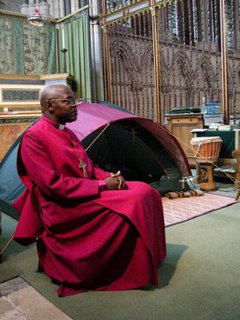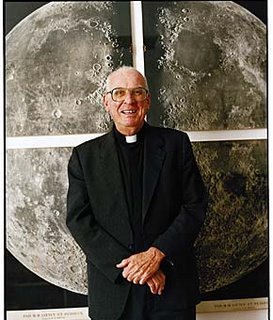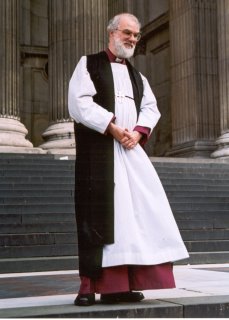Equal representation upheld as essential in decision-making processesBy Matthew Davies
Thursday, August 24, 2006
[Episcopal News Service]
More than two months after the historic election of the Rt. Rev. Katharine Jefferts Schori as 26th Presiding Bishop of the Episcopal Church, congratulatory letters and messages of joy continue to flow, in particular from fellow Anglican women committed to gender equity and a world equally represented by men and women in its decision-making processes at all levels.
On behalf of the International Anglican Women's Network (IAWN), coordinator Priscilla Julie from the Diocese of the Seychelles in the Province of the Indian Ocean said, "We rejoice with so many others and congratulate you on this great achievement."
Describing the election as God's will, Julie noted that the timing is right, especially "when we need to heal the rift within the Anglican Communion worldwide," she said. "I strongly believe that, as a woman, your Grace will be instrumental in healing the wounds..."
Jefferts Schori, 52, was elected by the House of Bishops June 18 on the fifth ballot and from a slate of seven nominees.
An airplane pilot and former oceanographer, she will be the first woman to hold the top post in an Anglican province in the nearly 500-year history of Anglicanism.
She has served the Diocese of Nevada as its bishop since 2001 and will officially take office as presiding bishop on November 4, the day of her investiture at Washington National Cathedral. In her role as chief pastor of one of the 38 provinces of the Anglican Communion, she will also be the first woman eligible to attend the Primates Meeting when it next convenes February 12-19, 2007, in Dar Es Salaam, Tanzania.
Committed to the advancement of women in all spheres, IAWN encourages "women to take up responsible positions within our Anglican Communion," Julie noted in an August 15 letter to Jefferts Schori. "As Anglican women throughout the world we shall fully support you and continue to pray for tolerance, understanding, equality and justice for all in God's Kingdom."
Equally represented
Jolly Babirukamu, an Anglican Consultative Council (ACC) lay member from the Anglican Church of Uganda, noted the timeliness of the election, "particularly when we need a woman of positive influence to work with the male-dominated Primates," she said.
In June 2005, the ACC passed Resolution 13-31 acknowledging the Millennium Development Goal that calls for "equal representation" of women and men in decision-making processes at all levels [Full resolution].
Babirukamu, who upheld the importance of the ACC resolution, said she hopes and prays "that God will give [Jefferts Schori] favor, wisdom, knowledge and understanding to be the Esther and Deborah of the present times in the Anglican Communion."
Ana Lucia from the Anglican Church of Brazil believes that women play a critical role in the churches throughout the Anglican Communion, because many projects relate to issues such as violence against women, sexual abuse, and early pregnancy, among others.
"Because of that, we must be included at the decision-making tables, and have equal representation at all levels," she said. "I think that this election will have a wonderful impact in our churches around the world. Maybe [those] ... who do not accept the representation of women in some levels, will think again, and understand the importance of our work."
Helena Mbele-Mbong of the Convocation of American Churches in Europe, a lay deputy of General Convention, prefers to think of Jefferts Schori as the next presiding bishop who happens to be a woman.
Effective leadership
"Having said that, she will bring a woman's perspective to her role, along with her perspective as a scientist who also has a profound faith, a Christian deeply concerned about the well-being of the many in the United States and around the world who have so little and suffer unjustly, and a church leader who effectively calls others and brings people together to work on the tasks before us in carrying out God's mission," she said.
The Episcopal Church has ordained women for more than 30 years, so "it is inevitable that one would have the capacity to grow to the stature of a strong and viable candidate for presiding bishop," said Mbele-Mbong, a member of the IAWN steering group. "This is confirmation that both women and men have the gifts, depth of faith and intelligence, and vision of God's mission to take on the full range of leadership roles our Church offers."
Mbele-Mbong, who has served on the Standing Commission for World Mission for six years -- the last three as chair -- noted that equal representation is an important part of ACC 13-31, the Beijing Platform for Action and the Millennium Development Goals.
Upholding the significance of the United Nations Commission on the Status of Women (UNCSW), which last met in March 2006 in New York, Mbele-Mbong explained that many women around the world, including those in provinces where women's ordination is not yet accepted, will take heart in Jefferts Schori's election.
"Whatever some of the voiced differences in the Anglican Communion, all the women [at the UNCSW meeting] were united as we directed our energies toward the work of providing hope, justice and reconciliation to the many peoples who struggle for food, water, shelter, health care, and security, often in the face of poverty, injustice, turmoil and war," she said. "This was our common mission across all boundaries. Presiding Bishop-elect Jefferts Schori provides a beacon to us all as we each continue to fulfill our particular role within the Church and to the wider community to bring Christ's message of love and reconciliation."
Fourteen of the 38 Anglican provinces currently make provisions for women in the episcopate. At present, there are 13 active and retired women bishops and bishops-elect in the Episcopal Church and three in the Anglican Church of Canada. The Anglican Church of Aotearoa, Polynesia and New Zealand, has one retired woman bishop.
A sign of hope
For Mary Stallard of the Church in Wales, Jefferts Schori's election is "an affirmation that through baptism all are called to share their gifts" as well as being "a much-needed injection of hope for the church, for women clergy certainly, but more importantly for all women. It is a badly needed sign that the Gospel message is for everyone."
Recognizing the difficult task ahead for Jefferts Schori "in a church that is still very male-dominated," Stallard said she hopes that women and men "will surround her ministry with prayer, and support her in this pioneering role."
Acknowledging the importance of equal representation, Stallard noted that justice and equality are at the heart of the Gospel.
"The earliest church came to appreciate this as they struggled with their own issues of inclusion and came to understand that, 'there is neither Jew nor Greek, slave nor free, male nor female, for all of you are one in Christ,'" she said, referring to Paul's letter in Galatians 3:28. "One of the most important parts of the church's message has always been about speaking up for the voiceless and the disempowered. The Anglican Church, with congregations and people in almost every part of the world has serious potential to be a community with power to influence and enable change for the poor.
"However, we cannot preach a message of justice and empowerment for the poor while we act unjustly ourselves and fail to empower all of the people in our own structures," she added.
Among the international decision-making structures of the Anglican Communion -- specifically the Primates, ACC, and the Lambeth Conference -- Stallard noted that there are officially 800 people who represent the Church. "Of these there are currently only 30 women," she said. "That is a terrible record for a church that includes probably more women amongst its members than men.
"I hope that Bishop Katharine's election might give more women in the church the encouragement they need to hang on in there and see that the church might speak to their lives and their needs as well as engage their gifts and empower them to offer their lives to serve others."
Enriching the Church
Claudette Kigeme of the Anglican Church of Burundi said that Jefferts Schori was elected not only because she is a woman, "but as a competent person to fill this position and in answer to God's call on her life."
Also citing St. Paul's letter to the Galatians, Kigeme said that women have a right to contribute to building the Kingdom of God. "There are some aspects of church life to which women can make a unique contribution," she said.
A member of the Church of England's General Synod, Canon Cynthia Dowdle said that she was delighted to hear Jefferts Schori say that she would welcome opportunities to work with those who found her election difficult. "It is when people work together that they can begin to recognize the gifts we have all been given to enrich the church," she said, "and we can see the face of Christ in the other person."
Maori Anglican theologian Dr. Jenny Plane Te Paa, the "ahorangi" or dean of Te Rau Kahikatea (College of St. John the Evangelist) in Auckland, New Zealand, was a guest preacher at General Convention and one of the speakers at Presiding Bishop Frank Griswold's June 15 Forum: "Toward a Reconciled World." Te Paa said she was struck by both the "wonderful spirit of compassionate openness" among those in attendance and the "extraordinary richness of faith-filled public witness" which, she said, was her experience daily in worship and in the formal meeting sessions.
"It was, I believe, the wish of the Holy Spirit to give honor to the openness and the faithfulness of the Episcopal Church which moved the bishops gathered to select Katharine as their leader for a time such as now," she said, acknowledging that since the time of Jesus' own ministry women have played very significant roles as leaders, "as those who provide critical support for leaders, in the resourcing of ministry, as evangelizers, as nurturers of new believers, as teachers and as healers."
Te Paa called it "an indictment of church leadership" that virtually since the time following on from the death and resurrection of Jesus "the presence of women has been so consistently structurally and attitudinally repelled," she said, noting the glimmer of hope represented by ACC resolution 13:31. "What needs now to happen concurrently is that the existing institutional structures of the Church are all opened to the possibility of radical transformation."
Lisbeth Barahona, a social compliance manager from the Diocese of El Salvador, believes that Jefferts Schori's primacy will have a positive impact on the world and the Anglican Communion because "it is God's will that we may have women and men equally involved in bringing peace, justice, unity and a more sustainable society, through communication, leadership and understanding."
She agreed that, in the process of making decisions, different points of view and wider perspectives are needed to help achieve objectiveness and assure better and more effective choices, "and this happens when committed, truthful leaders, both men and women, join for a common goal."
-- Matthew Davies is international correspondent for the Episcopal News Service.














